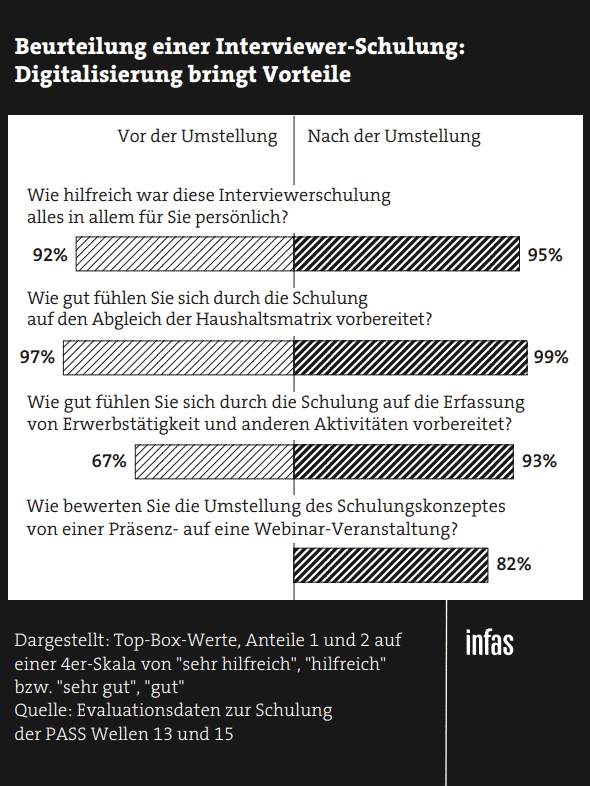Personal training of interviewers prior to surveys is a central aspect of empirical social research and an integral part of quality assurance. At infas they are obligatory. Basic qualifications are taught in one-day basic training events. In subsequent briefings and project training sessions, interviewers acquire study-specific knowledge.
Digitization accelerator Corona
While training in the past was predominantly classroom-based, the Covid pandemic has presented us with new challenges. There has been a shift from digital-analog training to purely digital training programs. Concepts of digitized training are basically nothing new. E-learning variants have been spreading in educational institutions for more than twenty years. At infas, too, digital elements were already found in training courses. Primarily, this was a hybrid form of training in which face-to-face events were supplemented with digital elements. In didactics, this mixture is referred to as ‘blended learning’. Learning content is not only conveyed in the event, but is also flanked by a preparation and follow-up phase. The training participants can concentrate on the essentials during the event. What is new now is the complete transfer of analog content into the digital space. Technically, this transformation was unproblematic. E-learning platforms and software for webinars are available and the interviewers are often familiar with them from other contexts such as school or university. The difficulty lay in translating complex social science procedures from classroom training courses lasting one or more days into focused digital formats. This was achieved by outsourcing parts of the event to an already established e-learning platform, namely Moodle.

The adaptivity of this platform enables the interviewer to go through the pre- and post-processing at any time in a structure specified by the training management. In addition, he can view his learning success and receive immediate feedback. Statistics are automatically generated in the background, through which the learning progress of the individual interviewer can not only be checked, but the type of knowledge transfer can be adapted to the study-specific requirements. This check is carried out by means of a learning level survey, which is part of the preparation phase. On the part of the interviewer, the changeover is a challenge – a clash of different demands. Social aspects are important, but so are the demands of the training managers to be able to communicate complex issues clearly. While aspects such as loneliness and motivation play a major role for students in purely digital training environments, other issues come into play for interviewers. For example, the ‘digital divide’, which is more significant than in other forms of learning. During a webinar, it is naturally more difficult to create the level of interaction that the interviewer is used to from a face-to-face event. Options such as video transmissions, requests to speak via chat, quizzes or group exercises provide a remedy. Digitization also changes the time factor, which not only affects travel to the training location, but also the duration of the event. Day events are not practicable as webinars, because from about four hours onwards the attention of the participants decreases despite breaks. In order to still be able to convey the same content, interviewers must go through a digitally supported preparation and follow-up phase for more complex studies. These are realized through analog as well as digital documents and knowledge queries on infas’ own e-learning platform. This has the advantage that interviewers can arrange their learning packages according to their learning style. The training manager can answer questions directly and provide assistance. Interviewers would like to see this interactive feature given a higher priority in training evaluations.
Promising results
In the evaluations that infas conducts with all participants following each training session, encouraging results emerge for the past year: In 93 percent of the feedback, the webinars are rated as good or very good. Four out of five said they were able to follow the content of the events fully and completely. And almost all participants in the basic training courses felt well prepared for the interviewer job. The PASS project, which evaluates after each survey wave, shows that interviewers sometimes feel significantly better prepared for difficult interview situations as a result of webinar training than they did as a result of previous classroom training. In addition, more than 80 percent of the interviewers from the most recent survey wave feel that the change in the training concept from a face-to-face to a webinar event as “good” or “very good”. Individual feedback from long-term interviewers confirms that the digitization of events is perceived as very fruitful and pleasant. One explanation for this may be that many interviewers had to travel from all over Germany for classroom training and can now follow the webinars more conveniently from home. This is also interesting for the institute in that it noticeably reduces training fees. On the other hand, interviewers state that they would like to have more personal exchange again, which face-to-face training would make possible. In the medium term, infas is planning a mixed form of face-to-face and webinar training. This compromise can combine the advantages of both concepts – psychosocial and didactic aspects of a face-to-face event on the one hand, resource savings and increased efficiency through digital measures on the other. In concrete terms, this means that a face-to-face exchange can take place on site with the project managers, while the learning process can be structured more transparently for the interviewer by digital means. In perspective, approaches such as ‘gamification’, i.e. the use of playful reward mechanisms, can create additional incentives for the interviewer to engage intensively with the content of the study. Both modes must be closely interlinked within a training program and constantly optimized as part of a continuous improvement process. Digitization of training measures must not lead to original classroom concepts being shifted one-to-one into the digital space. Rather, the aim is to use the peculiarities and synergy effects of digital media in such a way that interviewers are activated in the best possible way in order to impart knowledge in a sustainable manner. The training should not only be a learning process for the interviewer, but also a learning experience to ensure that the interviewer can go about his or her work confidently in terms of content and motivated.
Zum Weiterlesen: Daikeler, J., Bosnjak, M. (2020): How to Conduct Effective Interviewer Training. In: Kreuter F. et al. (Hrsg.): Interviewer Effects from a Total Survey Error Perspective, Chapman and Hall, New York Daikeler, J., Silber, H., Bosnjak, M., Zabal, A., Martin, S., (2017): A General Interviewer Training Curriculum for Computer-Assisted Personal Interviews. In: GESIS Survey Guidelines. Mannheim. Mittereder, F. et al. (2018): Interviewer–respondent Interactions in Conversational and Standardized Interviewing, Field Methods, 30(1), S. 3–21.
Photo by Ishtiaque Hossain on Unsplash

